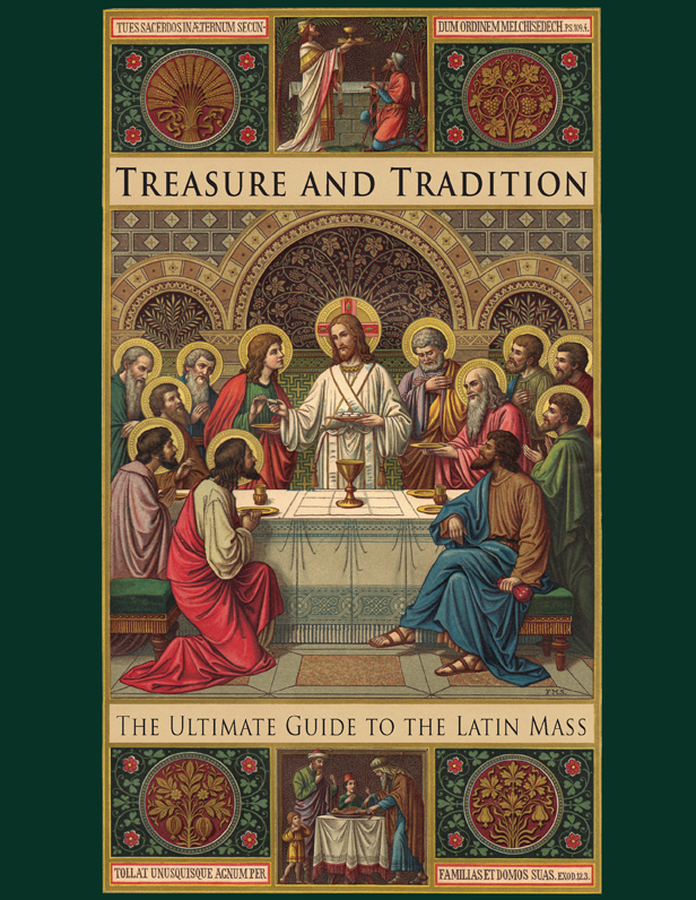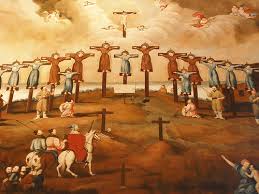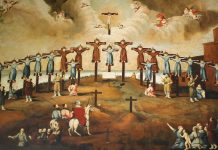Once I gave a talk on Saint Andrew. It was in Kenaston, Saskatchewan, in a church dedicated to Saint Andrew. At the end of my remarks, the parish priest opened the floor for questions. The first one I directed to him: “Why don’t they ring the bells at funerals any more?” The second was more interesting, though equally remote from Saint Andrew. A lad of eleven or twelve asked, “Why are there no dinosaurs in the Bible?” What a good question, I thought, opening as it does the whole area of modern science and scriptural truth. I told the boy that the Bible was concerned, not with the working of the physical world, but with what was most essential to human beings. But that statement invites another question: exactly what is essential to a human being? A glance at today’s reading provides an answer, for the Bible’s main message is about morality, about distinguishing what is right from what is wrong. It is the power to choose that distinguishes us from plants and animals. Their behaviour is instinctive, while man’s is—or should be—reasonable. Ezekiel reminds us of this in describing, at an individual level, what was the case with Israel as a nation, viz., evil actions are punished and virtuous ones rewarded, since they are the result of free choice. Ezekiel further notes that a good person may fall into sin, just as an evil one may seek forgiveness.[1] This principle continues in the New Testament, in the parable of the two sons, one who breaks his word and the other who repents.[2] In the same vein, Saint Paul invites us to “let the same mind be in you that was in Christ Jesus.” And how does this mind show itself? In upright behaviour: “Do nothing from selfish ambition or conceit, but in humility regard others as better than yourselves.”[3]
It’s all very well for the preacher to tell people to be nice. That’s the burden of most sermons, is it not? But what does that mean in Canada, in Toronto today, 2020? An obvious starting point would be COVID-19 and its effect. We have been forced to develop what I may call a social awareness, in that my care, or lack of it, has immediate and serious consequences for others. (Or so it is reported by our medical experts, but such ‘immediate and serious consequences’ apply primarily to the very elderly or very vulnerable, and to impose such fear and isolation upon the whole of society for much longer will have deleterious and unforeseeable consequences. Editor).
Pondering this fact should lead us to realize that the same principle applies to all of our actions, for what I am as a person influences those around me and thus contributes to the well-being or deterioration of society as a whole. I can summarize all this by an axiom of theology: “there is no such thing as a private sin.” That tired old excuse for wrongdoing, “It doesn’t hurt anyone,” is false for sinful acts change who I am and so will, in one way or another, have their effect on people around me, even if only negatively, in that I am not available to them as they need me to be. For we are Christians, called to the imitation of Christ, “who came not to be served but to serve, and to give his life as a ransom for many.”[4] And so the proper response to the murderous Cain’s question, “Am I my brother’s keeper?”[5] is a resounding “yes!”
No man is an island, entire of itself; every man is a piece of the Continent, a part of the main; . . . any man’s death diminishes me, because I am involved in Mankind; and therefore never send to know for whom the bell tolls; it tolls for thee.[6]
Such considerations bring us to what is known as a social conscience, a matter to which Pope Francis has continually called our attention, whether with regard to refugees or climate change. (Again, we must add that the Pope has his opinion about the scientifically dubious – in fact, unproveable – ‘climate change’, which does not bind us in conscience. And the refugee question is too complex and fraught to go into here. Editor). The Holy Father stands firmly here in a long tradition which in one form of another can be traced back to its biblical roots. More recently that than, however, we have the great papal encyclicals on social justice beginning with Pope Leo XIII’s Rerum novarum (1891), subtitled “On Capital and Labour,” and continuing to our own day with Share Lent and Development and Peace. (Which have their own problems and entaglements! Editor). My feeling—correct me if I’m wrong—is that many of us Catholics have been unenthusiastic or even insensitive to these social issues. In all the years I have been hearing confessions, I can recall only one instance of a penitent exhibiting anything like a social conscience; I nearly fell off my chair. He confessed smuggling, a sin in that it exhibited disregard for, and encouraged a weakening of the order of law. This was a particular difficult moment for me, as I’m from near Windsor, where smuggling was a universal practice that nobody considered wrong. My own dear mother, the soul of virtue, had smuggled most of her wardrobe across the border.
The fact is that every society, like me and my mother, has its blind spots. How eager we are at the present time to decry the sins of the past, and rightly so. The economic theories of the nineteenth century, e.g., accepted and even promoted child labour and atrocious working conditions for women . . . and for men. There is a fashion in morality as there is in clothing. We all but unconsciously dress in a way that identifies us as living in Toronto in the year 2020; well, the same holds true for morality, the way we think about the goods and ills of society. There’s a something in today’s atmosphere that makes certain viewpoints obvious to most people, without the need for rational examination. When I was at the University of Saskatchewan, for instance, I recall that the sociology department was composed of exclusively of Marxists, each and every one. Despite the fact that they all thought alike, I am sure that they regarded themselves as rugged individuals in their views, and indeed they could defend their position persuasively. My claim is this: that their arguments defending Marxism followed rather than preceded their commitment to it. It was in the air they breathed. Similarly, you can predict with ninety-nine percent accuracy what any public figure accepts on the “hot button” issues regarding, e.g., the definition of marriage or reproductive rights. They can argue their position as an atheist can argue his, but they don’t have to for, as “everybody” knows, they’re right.
As Catholics, we have a defence against merely mouthing current cant, for we honour tradition, that is to say, we can see what was right as well as what was wrong with the past. In this regard, we might ask what lay behind nineteenth-century attitudes that seem to us narrow and intolerant. The answer is that society was then based on the primacy of the family, and not on rights of the individual. Behaviour or legislation, of any sort, that weakened the stability of family life was strongly, vehemently opposed. Divorce, for example, was rare; in England, during the three hundred centuries between 1550 and 1850, there were on the average two divorces a year.[7] It is not that all marriages were happy or that there was no infidelity, only that people then believed that society as a whole was better off when marriage was permanent than when it was not: “What God has joined together, let not man put asunder.”[8] (To go further, society cannot survive without marriage being permanent. Editor)
We are also open to learn something from the Middle Ages, unlike our contemporaries for whom “mediaeval” is synonymous with cruelty, intolerance and superstition. But as Catholics we can admire the society that built magnificent cathedrals, that invented the university, that produced Saint Francis of Assisi, Dante and that firebrand Saint Catherine of Siena. And from the early Church, in the time of the Roman Empire, we have received our creeds and the form of our worship that we follow to the present day. It also witnessed the beginnings of monasticism, the genius of Augustine, the courage of Athanasius, and the heroic virtues of Paula of Rome and Melanie the Elder. For all of these reasons, then, we open our ears when we hear Saint Paul: “Do not be conformed to this world but be transformed by the renewal of your mind, that you may prove what is the will of God, what is good and acceptable and perfect.”[9] He was speaking to us as well as to his fellow Christians in Rome.
[1] Ez 18.25-28; today’s first reading.
[2] Matt 21.2-32; today’s Gospel.
[3] Phil. 2.5, 4; today’s second reading.
[4] Mark 10.45.
[5] Gen 4.9.
[6] “No man is an Iland, intire of it selfe; every man is a peece of the Continent, a part of the maine; if a Clod bee washed away by the Sea, Europe is the lesse, as well as if a Promontorie were, as well as if a Mannor of thy friends or of thine owne were; any mans death diminishes me, because I am involved in Mankinde; And therefore never send to know for whom the bell tolls; It tolls for thee.” John Donne, Devotions upon Emergent Occasions.
[7] In Scotland, there was only one a year. Encyclopedia of Religion (Charles Scribner’s Sons: New York, 1908-26), s.v. “Marriage.”
[8] Mark 10.9.
[9] Rom 12.2.












